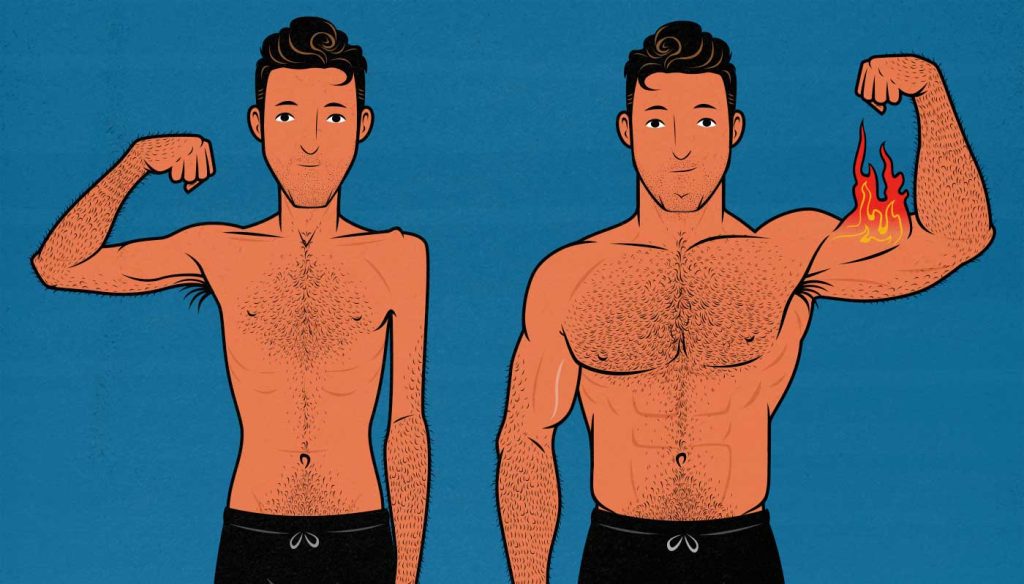
Can You Build Muscle On Keto? Most Research Says You Can’t
People have been using keto to lose weight for the past 200 years. For example, in the 1970s, it saw a surge in popularity because of the Atkins Diet, which started with a strict ketogenic phase.
During that same time period, bodybuilders have leaned towards higher-carb diets. Conventional bulking diets get most of their calories from carb-rich foods like rice, potatoes, sweet potatoes, oats, bananas, yogurt, beans, and lentils.
What happens if you try to use a ketogenic diet to build muscle? Will it hinder muscle growth? Can it yield leaner gains?
- What is Keto?
- Why Cut Back on Carbs?
- How Does Keto Affect Weight Training & Muscle Growth?
- How Do Carbohydrates Affect Muscle Growth?
- Does Keto Reduce Fat Gain While Building Muscle?
- Are There Advantages to Building Muscle on Keto?
- What Happens If You Bulk On Keto?
- What About the Other Keto Bulking Study
- Summarising the Research on Keto & Muscle Growth
- How to Eat a Ketogenic Bulking Diet
- Summary
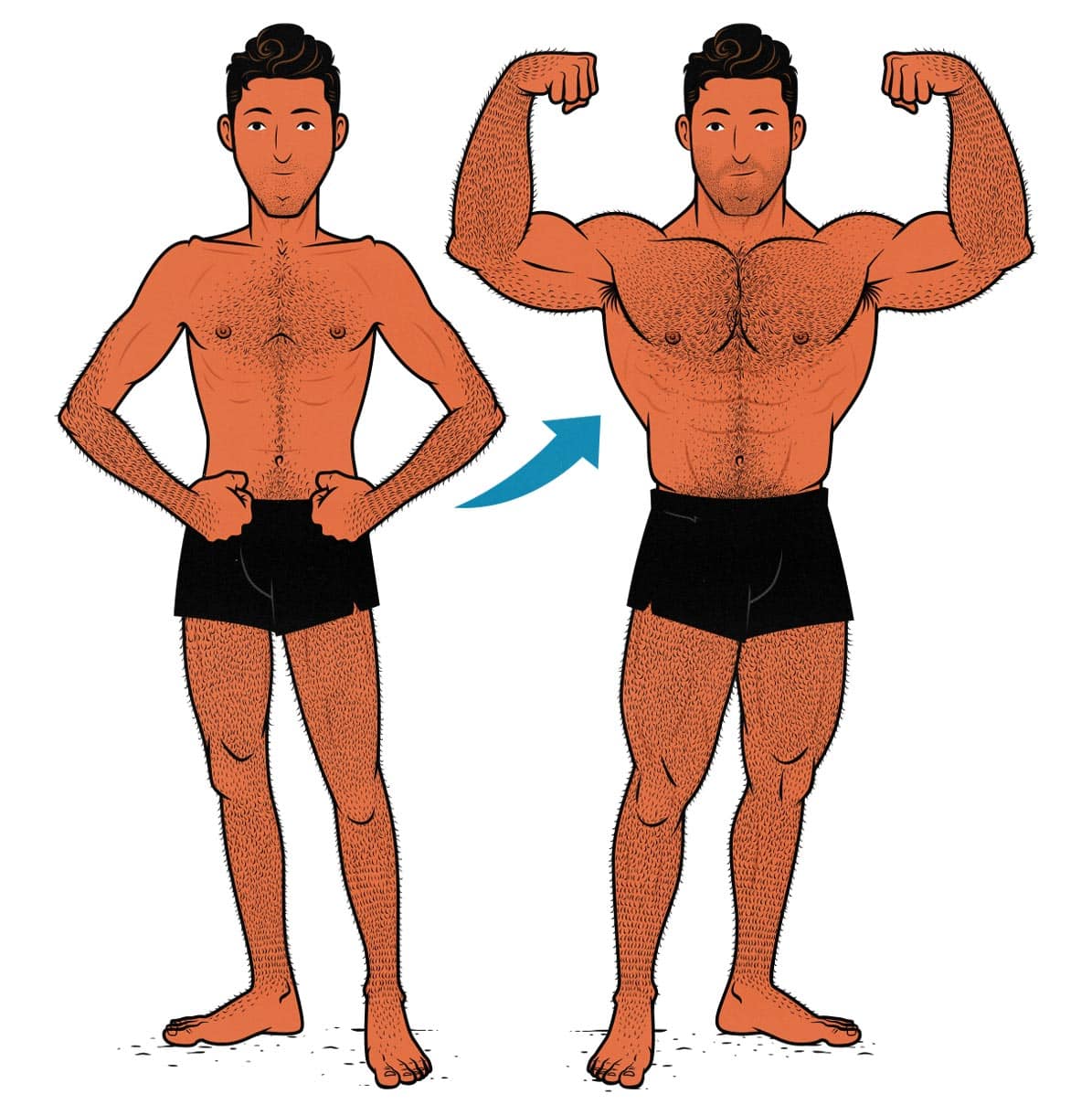
What is Keto?
What is the ketogenic diet? The ketogenic diet is a high-fat, moderate protein, and very-low-carb diet based around eating plenty of meats, eggs, cheeses, nuts, avocados, oils, and fibrous vegetables. For example, a meal might be a fatty cut of steak with a large portion of salad drizzled in olive oil.
What is the ketogenic bulking diet? Since this article is about how a ketogenic bulking diet performs against a traditional muscle-building diet, we’re going to use the best versions of both:
- Standard bulking macros: 25% of calories from fat, 55% from carbs, 20% protein
- Ketogenic bulking macros: 75% of calories from fat, 5% from carbs, 20% protein
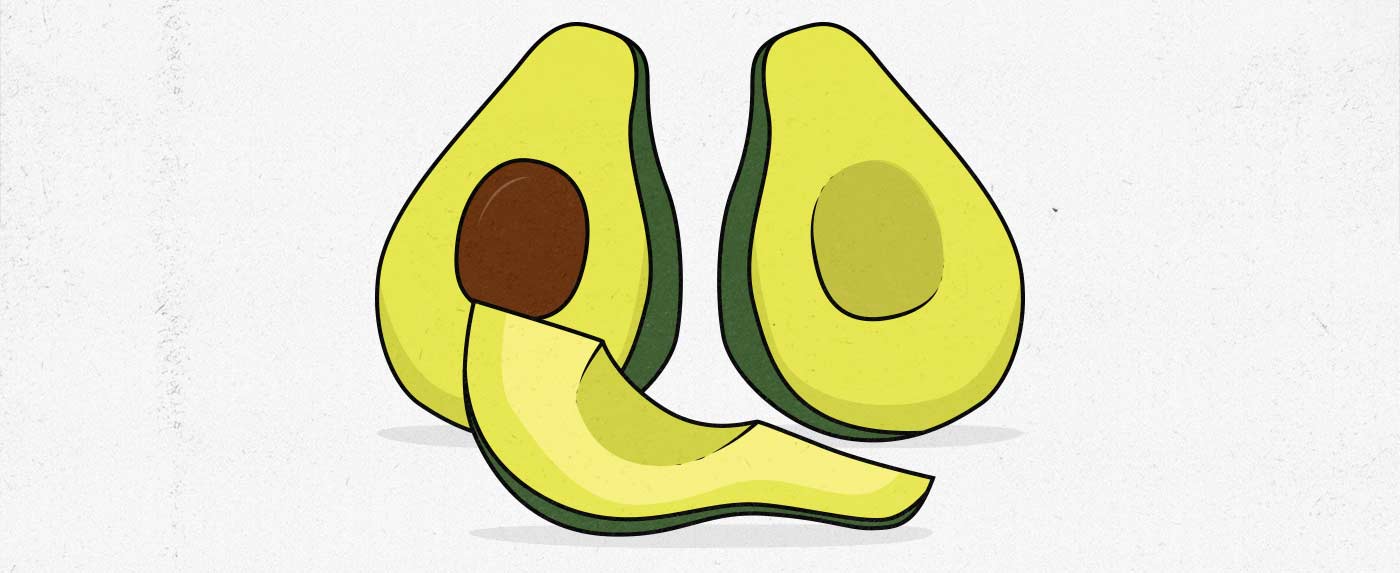
Both of these diets have the perfect amount of protein, it’s just that one is high in carbohydrates, the other has almost none.
Why Cut Back on Carbs?
When you eat carbohydrates, your body breaks them down into a type of sugar called glucose, which the cells in your body use for energy. Your muscles and liver store sugar as glycogen, your blood vessels transport it around as blood sugar, and your brain even runs on sugar.
If you stop eating carbs, though—either by fasting, starving, or eating a ketogenic diet—your body can no longer use sugar as its main fuel source, so it begins breaking down fatty acids into ketone bodies (ketones). Over the course of the next few days, your cells switch over to using these ketones for fuel. This process is called ketosis, the foundation of the ketogenic diet.
What’s the purpose of ketosis? What’s exciting about ketosis is that your body starts burning your body fat for energy. Now, to be clear, any diet that allows you to get into a calorie deficit will allow you to lose fat just as quickly (study, study).
If you eat a high-fat diet, you’ll store more fat and burn more fat. If you eat a high-carb diet, you’ll store less fat and burn less fat. Either way, it balances out in the end. Still, many people like the idea of directly using fatty acids for energy.
The main advantage of the ketogenic diet is that it suppresses appetite, allowing people to feel fuller while eating fewer calories (meta-analysis).
How Does Keto Affect Weight Training & Muscle Growth?
When we lift weights, our muscles run on a carb-based fuel called glycogen. The more glycogen we have in our muscles, the longer we can work out before our muscles run out of fuel. If we switch to a ketogenic diet, fewer carbs are available, so our muscles won’t store as much glycogen as they normally do (study, study). Because our muscles aren’t as pumped full of fuel, they’ll look a little smaller and flatter, and they won’t have as much strength endurance.
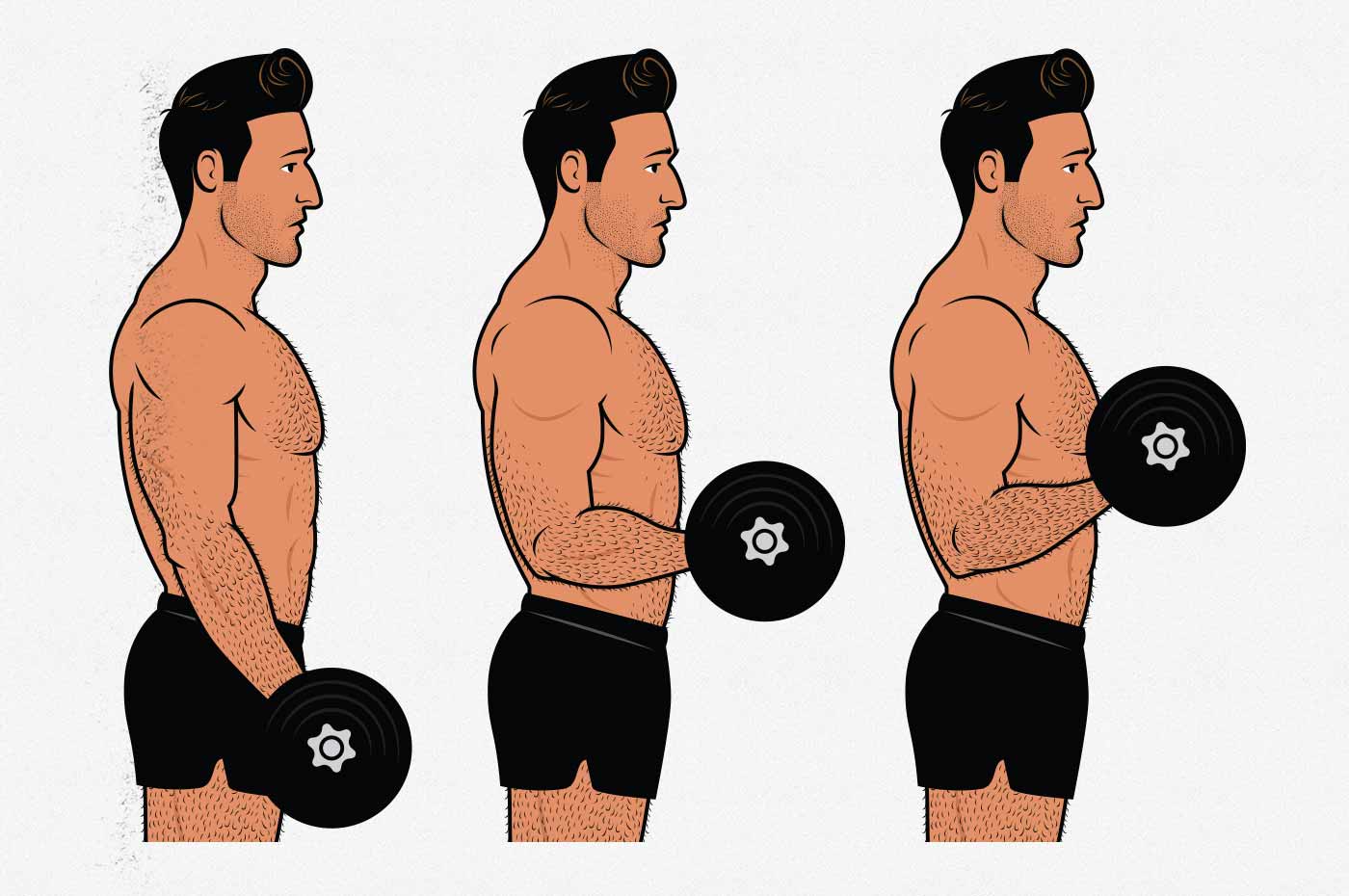
Glycogen doesn’t have a big impact on strength training (study, study). There aren’t many reps per set (1–5 reps) and there aren’t many sets per workout. It’s a style of training that doesn’t require much muscle fuel, just muscle strength. However, compared to other types of resistance training, strength training doesn’t stimulate quite as much muscle growth.
If you’re trying to get bigger and stronger, you should do hypertrophy training. That means doing moderate-rep sets, typically in the 6–20 rep range. That helps us lift more total poundage each workout giving us a higher training volume, stimulating more muscle growth, but also digging deeper into our glycogen stores. Thus, having more glycogen becomes an advantage.
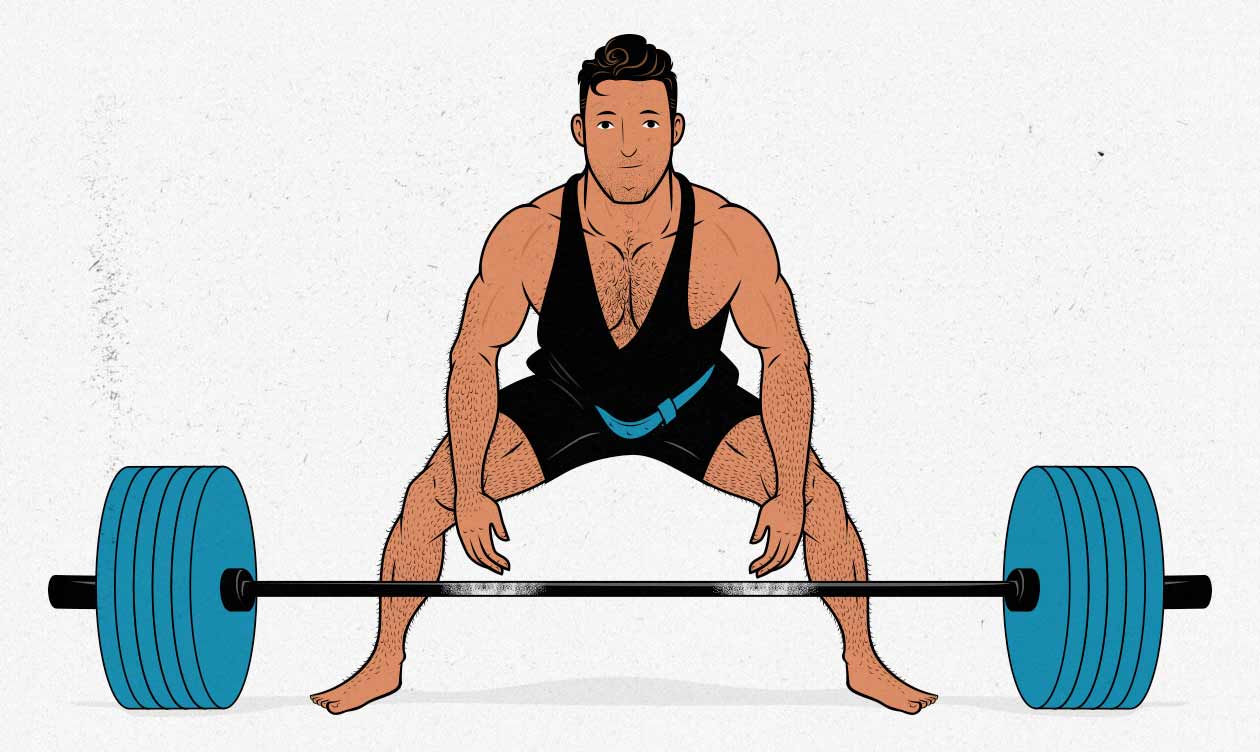
Mind you, our muscles store quite a bit of glycogen, and even with hypertrophy training, we won’t run out of glycogen unless we train a single muscle group for several hours in a row. Thing is, we aren’t just trying to avoid running out of glycogen; we’re trying to get the performance-enhancing effects of being absolutely packed full of glycogen.
How Do Carbohydrates Affect Muscle Growth?
Most research shows that the more glycogen we have in our muscles, the more muscle we can build (study, study, study). For instance, having more glycogen in our muscles reduces muscle damage while speeding up muscle growth, allowing us to construct more new muscle tissue (study, study).
Furthermore, weight training stresses our bodies. It’s a good type of stress, but it’s stress nonetheless. Higher-carb diets help manage this stress, keeping our testosterone production higher and our cortisol production lower (study). This is important because having higher testosterone can help us build more muscle more leanly, whereas higher cortisol (a stress hormone) can reduce muscle growth, increase fat storage, and suppress our immune systems.
Finally, there’s insulin, which is used to shuttle nutrients toward fat storage or muscle gain. Both protein and carbs stimulate insulin production, meaning that even a ketogenic diet will produce enough insulin to help you build muscle. However, eating more carbs seems to do a better job of this (study, study).

The muscle-building benefits of carbohydrates are well known, even in the ketogenic communities. That’s why there are carbier versions of the ketogenic diet designed for those trying to build muscle:
- Cyclical Ketogenic Diet (CKD): The cyclical ketogenic diet allows people to load up on carbs 1–2 times per week, allowing them to get some of the muscle-building benefits of a higher-carb diet.
- Targeted Ketogenic Diet (TKD): The targeted ketogenic diet allows people to eat a small number of carbohydrates before working out, allowing them to get some of the performance-enhancing effects of carbohydrates.
However, a recent study found that a conventional bodybuilding diet was better for building muscle, gaining strength, and avoiding fat gain than a cyclical ketogenic diet.
Does Keto Reduce Fat Gain While Building Muscle?
When we’re in a calorie surplus, we have extra nutrients. We can do a few things with those surplus nutrients:
- Carbs can easily be stored as muscle glycogen, improving lifting performance and muscle growth
- Protein can be burned off as body heat and used to build muscle
- Fat can easily be stored as body fat
Protein and carbs can be converted into fat (de novo lipogenesis), but it’s rare and inefficient. What usually happens is that we use the protein and carbs, then save some of the fat. We all eat some fat, so we all have fat to set aside. Still, bulking diets higher in protein and carbs may yield slightly leaner gains than those higher in fat (study).
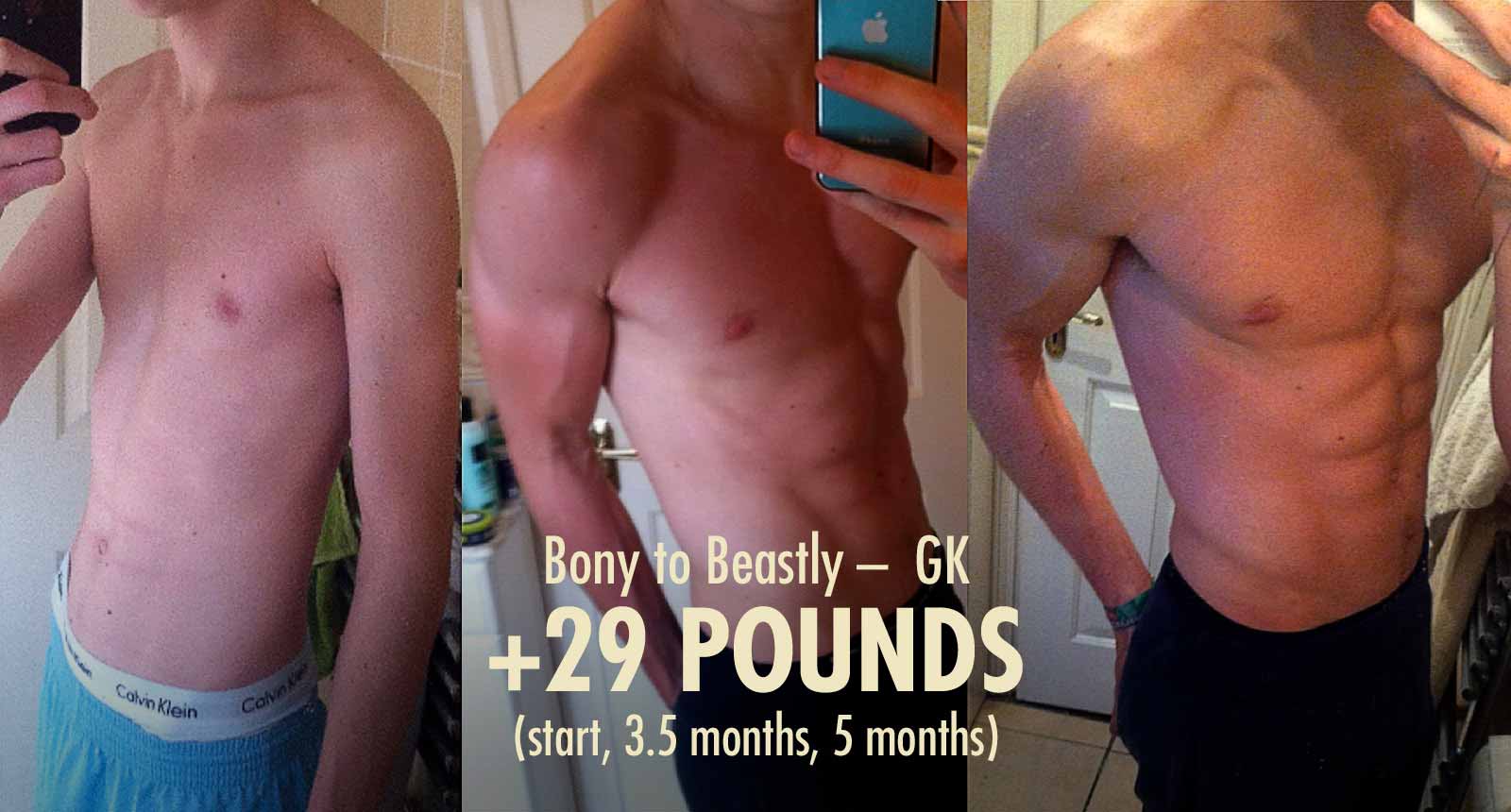
Are There Advantages to Building Muscle on Keto?
Most people doing keto aren’t interested in building muscle; they’re interested in losing weight. The reason they love keto is that it suppresses their appetite. This doesn’t always interfere with muscle growth. Overweight people have extra energy in their extra fat, so they can often build muscle even while losing weight.
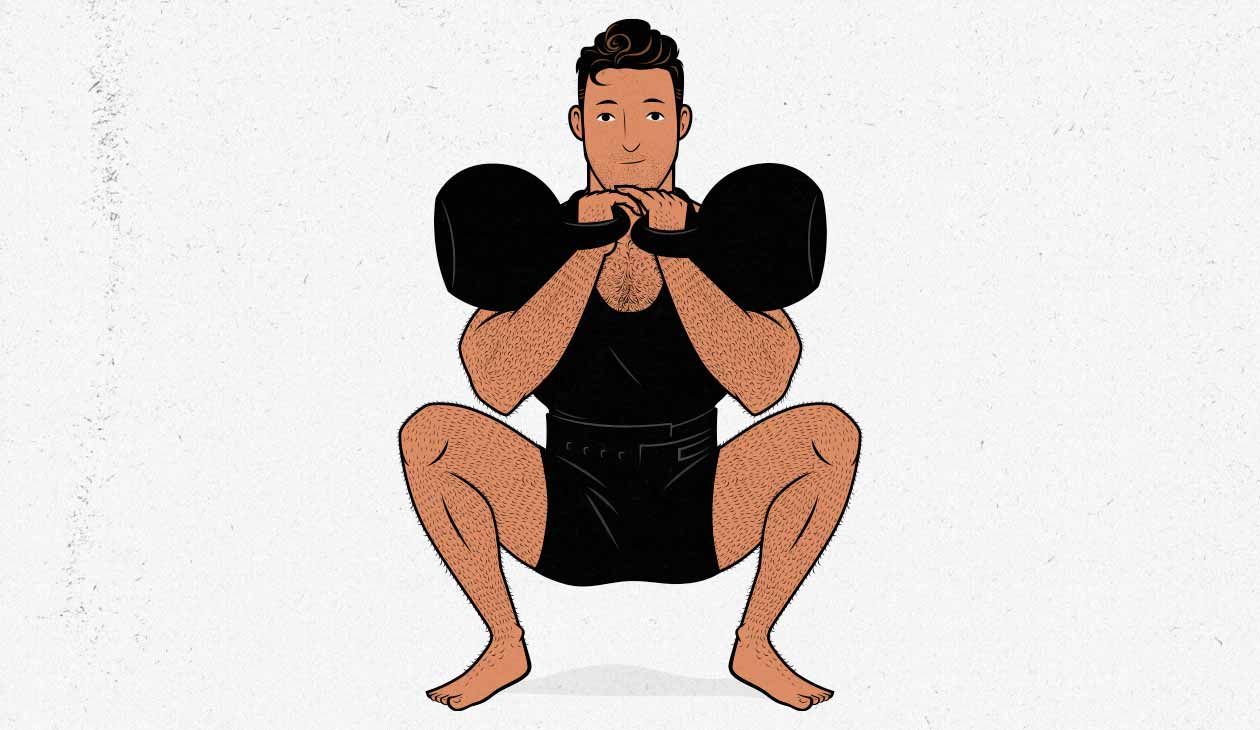
If you’re a skinny guy who’s trying to bulk up, appetite suppression can be a real problem. Eating a big bulking diet is already hard. Keto only makes it harder.
It’s especially hard during the first month or two of keto. Your body won’t be used to digesting so much fat, which can cause indigestion. It’s also common to feel fatigued, known as the “keto flu.” After adapting to the diet, it becomes a little easier to eat more calories. But it’s never as easy as bulking with a more balanced diet.
What Happens If You Bulk On Keto?
Until recently, there was only one high-quality study investigating what happens if you bulk on a ketogenic diet. The results are interesting. Not surprising, but interesting.
The researchers split the study participants into a ketogenic group and a high-carb group:
- High-Carb: 25% from fat, ~55% carbs, 2g/kg protein
- Ketogenic: ~70% fat, less than 10% carbs, 2g/kg protein
Both groups were put on a 4-day/week lifting program. Both groups were put on a high-calorie bulking diet. After eight weeks, here’s what happened:
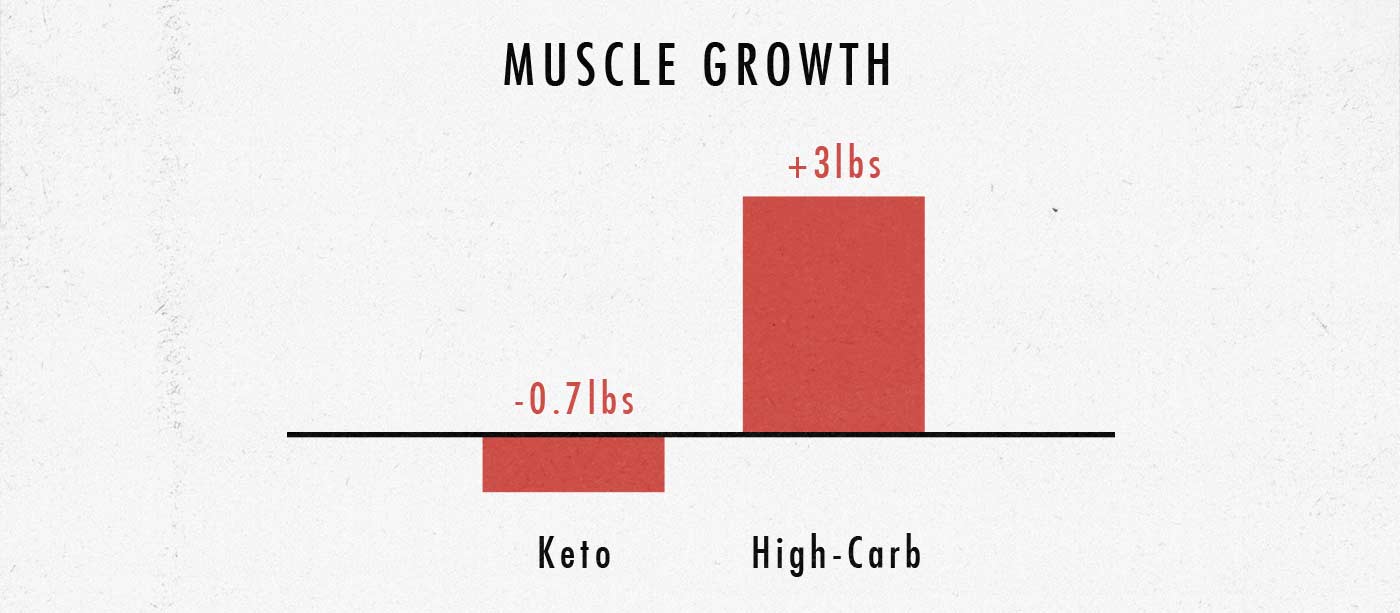
- High Carb: +3 pounds muscle, -1 pound fat
- Ketogenic: -1 pound muscle, -2 pounds fat
The high-carb group gained a substantial amount of muscle while losing some fat. That might not seem like much muscle growth in 8 weeks, but these were experienced lifters, so that’s to be expected.
The ketogenic group lost muscle, so the researchers (perhaps mistakenly) concluded that ketogenic diets weren’t good for building muscle. However, their failure to consume enough calories could easily explain their failure to build muscle. Despite their best efforts, they weren’t bulking. They were cutting.
It’s never wise to put all of your faith in a single study, but there’s a growing body of evidence with similar findings:
- A case study found that after switching to a ketogenic diet, four out of the five lifters stopped gaining muscle mass. One of the researchers, Eric Helms, PhD, commented that “if your goal is to put on muscle mass, it’s probably best to have some level of carbohydrate in your diet.” Based on his review of the research, he recommends a bare minimum of one gram of carbs per pound bodyweight per day.
- In a study on CrossFitters, the ketogenic group lost muscle. The control group gained muscle.
- A couple of other studies found that when strength athletes stopped gaining muscle when they switched to a ketogenic diet.
However, these studies mainly show that ketogenic diets suppress appetite. On average, the participants failed to gain weight. They weren’t able to bulk. So we don’t actually know what happens when people bulk on a ketogenic diet.
What About the Other Keto Bulking Study
Since we’re talking about bulking on a ketogenic diet, we should probably mention the elephant in the room. One study found that keto caused rapid muscle growth (study). This study is somewhat suspect, but let’s start by breaking it down.
The researchers split the participants into two groups:
- High-Carb: 25% from fat, 55% carbs, 20% protein
- Ketogenic: 75% fat, 5% carbs, 20% protein
After 11 weeks of doing a 3-day/week lifting program, their results were:
- High-Carb: +4.8 pounds of muscle, -3.3 pounds of fat
- Ketogenic: +9.5 pounds of muscle, -4.8 pounds of fat
That’s quite a lot of muscle growth, but that’s not why the study is dubious. As we covered in our newbie gains article, plenty of studies find tremendous rates of muscle growth, especially in untrained lifters:
- This study on beginners found that guys could gain 9 pounds of muscle during their first 8 weeks of working out.
- In this study, a group of untrained beginners gained an average of 12 pounds of muscle during their first 10 weeks of working out.
- In another study, beginners gained 15 pounds of muscle during their first 12 weeks of lifting weights.
Some people can build muscle when they bulk aggressively. If someone’s workout program and lifestyle are good enough, perhaps the ketogenic diet can produce those same results.
Here’s where the controversy begins. This study is just a one-page summary of research that isn’t available anywhere. Moreover, these are the same researchers that published a controversial study on HMB, showing that it produced more muscle growth than high doses of steroids. Those results couldn’t be reproduced by other researchers (study).
I’m an outsider, though. Maybe there’s more to this story. So I reached out to Brad Dieter, PhD, a researcher who’s written about the ketogenic diet. He told me:
The literature surrounding ketogenic diets and muscle growth is still nascent and has methodological issues that prevent us from drawing any real meaningful conclusions. Currently, from my perspective, there isn’t much data one can use to suggest it is superior to other approaches or to show it is not inferior to other approaches
Brad Dieter, PhD
Overall, I think it’s wise to be skeptical of any single study. Especially suspicious studies like this one. If other researchers can’t reproduce the results, you probably can’t, either. Fortunately, since this article was originally published, more research has emerged. Let’s dive even deeper.
Summarising the Research on Keto & Muscle Growth
The Schoenfeld Keto Study
Dr. Brad Schoenfeld recently conducted his own research into whether ketogenic diets were effective for building muscle. His study found, in keeping with the overall body of evidence, that ketogenic diets weren’t ideal for building muscle. One of the main reasons the ketogenic diet failed to produce much muscle growth was because the participants failed to get into a calorie surplus.
Dr Schoenfeld summarized these findings by saying, “when considering this study in context with the body of literature, a general take-home would be that the keto diet is a viable strategy for losing body fat, but would not be ideal if your goals are to maximize strength and hypertrophy.”
The Vargas-Molina Keto Study
We also have a 2020 study from Vargas-Molina and colleagues showing that, once again, the keto bulkers struggled to eat enough food to support muscle growth. However, even if the keto participants had gotten into a calorie surplus, hypertrophy training tends to be done in moderate-to-high rep ranges, which benefits from having plenty of glycogen in our muscles. Keto diets tend to reduce the glycogen we store in our muscles. As a result, the non-keto group gained significantly more muscle size and strength than the keto group.
The current evidence doesn’t suggest that it’s impossible to gain muscle on a ketogenic diet, but its effects on appetite and high-intensity exercise performance make it hard to view keto as the ideal dietary approach for gaining muscle.
Eric Trexler, PhD
The Adam Tzur Study: The Ketogenic Diet’s Effect on Bodybuilders
A 2020 study by Adam Tzur and Brandon Roberts, PhD, found that ketogenic diets reduce glycogen storage. They concluded that keto is “suboptimal for bulking and gaining lean mass.”
The Paoli Study: Keto vs Conventional Bodybuilding Diets
The most recent study pitting the ketogenic diet against a conventional bodybuilding diet is a 2021 paper by Paoli et al. Some participants ate a ketogenic diet, getting just 5% of their calories from carbohydrates. The others were put on a conventional bodybuilding diet, getting 55% of their calories from carbohydrates. The keto group had trouble eating enough calories and struggled to build muscle.
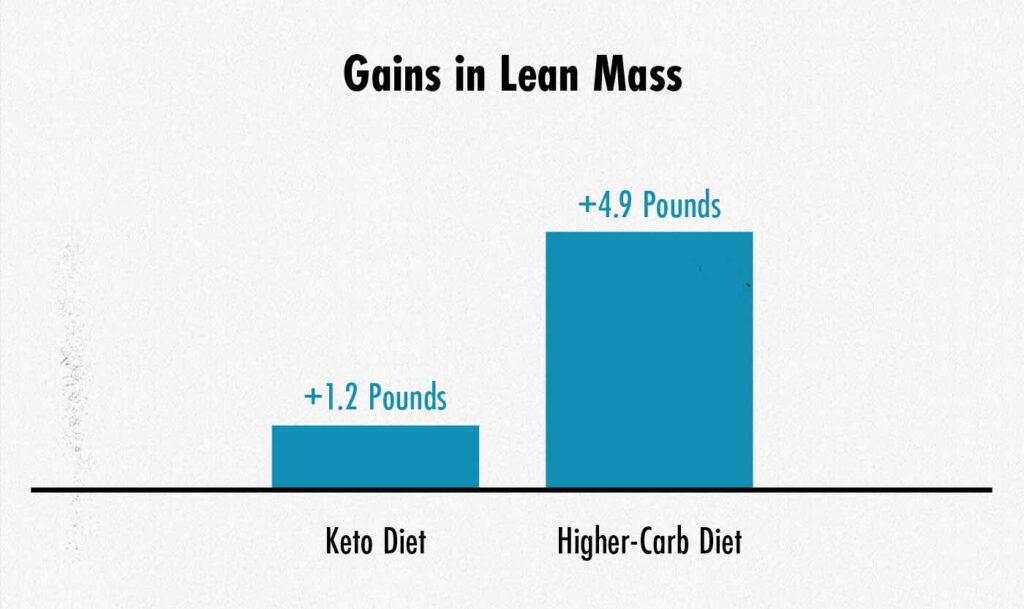
This study brings up an interesting point, though. Our muscles store less glycogen when we eat fewer carbohydrates, causing our muscles to deflate. This doesn’t necessarily mean we have less contractile tissue, though, just that our muscles aren’t as pumped full of glycogen. Perhaps the ketogenic bulkers are gaining contractile tissue, just losing glycogen.
The Vargas-Molina Meta-Analysis: Maximal Strength
A 2024 meta-analysis by Vargas-Molina and colleagues found that people following a ketogenic diet gained slightly less 1-rep max strength than being who ate more carbs, but the differences didn’t reach statistical significance.
How to Eat a Ketogenic Bulking Diet
Even if keto isn’t ideal for building muscle, there are other reasons why someone might want to follow a ketogenic diet. Maybe they’re having trouble digesting carbs. Maybe they’re struggling to control their ravenous appetite. Maybe they simply prefer it.
Here’s how to eat a healthy ketogenic diet that supports muscle growth:
- Eat enough calories to gain weight: for a beginner, we usually recommend gaining about a pound every week, which means eating around 500 extra calories each day (which is usually a total of around 18–22 calories per pound body weight per day). If a week goes by and you don’t gain weight, add another 200 daily calories. Adjusting every week will allow you to keep gaining weight even as your metabolism adapts to your bulking diet. For more experienced lifters, gaining 0.5 pounds per week usually works better.
- Eat enough protein (0.8g/lb/day): eating around 0.8 grams of protein per day should allow you to build muscle at a maximal pace while having no trouble staying in ketosis. This is usually pretty easy while on a ketogenic diet, and most guys doing keto naturally eat enough protein for muscle growth.
- Eat mostly whole foods: on a ketogenic diet, this usually means eating lots of unprocessed meat, dairy, eggs, nuts, seeds, avocados, very dark chocolate, and tons of fibrous vegetables. Watch out for letting your saturated fat intake rise above 10% of your total calories. That usually means getting most of your fat from nuts, seeds, avocadoes, olives, and olive oil. Avocado oil tends to make for the best cooking oil.
- Eat a diet that’s easy on the appetite and easy to digest: You might want to lean towards ground meat, which is easier to chew and digest, making it easier to get into a calorie surplus. Use high-calorie condiments like aioli and mayonnaise (made from ingredients like olive oil, eggs, garlic, mustard, and vinegar). Drizzle your salads with plenty of olive oil.
The main challenge of bulking on a ketogenic diet is eating enough calories to gain weight. However, there are ways around that. Here’s our guide for how to eat more calories. It’s not specific to the ketogenic diet, but the same principles apply.
Summary
Most people lose weight while eating a ketogenic diet, severely limiting muscle growth. Even if you can eat enough calories to gain weight, you’d still build muscle faster and more leanly by including more carbs in your bulking diet.
If you choose to bulk on a ketogenic diet, make sure you’re eating in a calorie surplus—that you’re gradually gaining weight. For most skinny guys, that means gaining 0.5–1 pound per week.

If you want more muscle-building information, we have a free bulking newsletter for skinny guys. If you want a full bulking program, including a 5-month workout routine, diet guide, recipe book, and online coaching, check out our Bony to Beastly Bulking Program. Or, if you want an intermediate bulking routine, check out our Outlift Intermediate Bulking Program.
Muscle-Building Mini-Course via EMAIL
Sign up for our 5-part muscle-building mini-course that covers everything you need to know about:
- Hardgainer genetics and how to make the most of them.
- How to take a minimalist approach to building muscle while still getting great results.
- What you need to know about aesthetics, health and strength while muscling up.


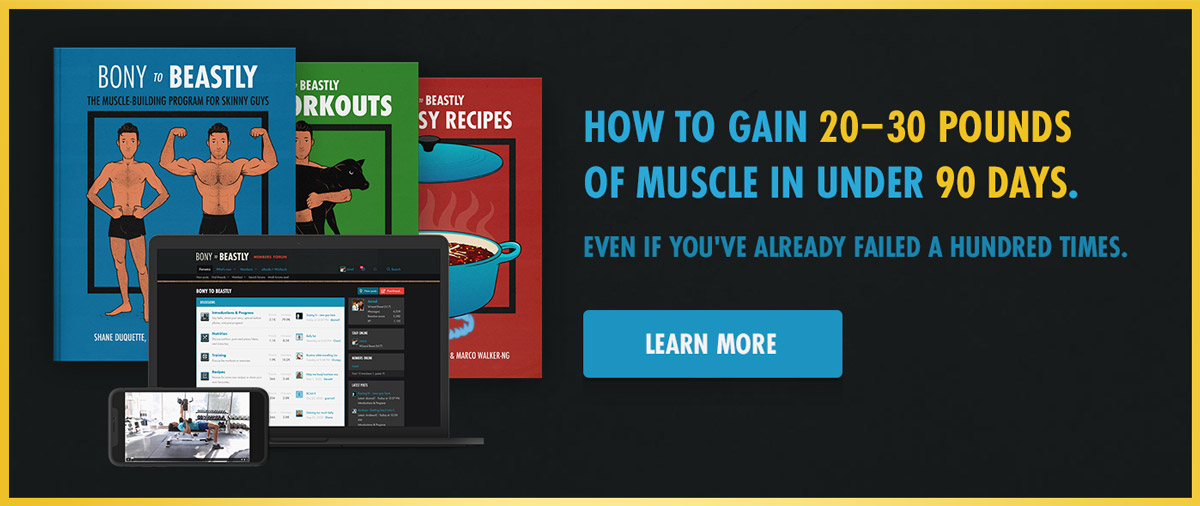


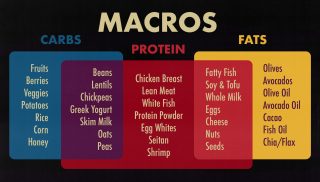
love this! I am a BIG fan of the ketogenic diet and have been on it since March and it has been absolutely amazing for my chronic stomach issues. That being said though, it is SOOOO difficult to try and bulk on.
Also, I think that in general the keto diet is very difficult to sustain (more meal-prepping, more cooking, and less readily available options) and do not recommend it to anyone who doesn’t need or want to try it.
Again, I LOVE keto, and I also FULLY agree with this article, haha.
Woot, glad you dug it! I was thinking of your email while writing this.
Have you noticed bulking getting any easier now that you’ve spent a couple months adapting to keto? That’s something these studies don’t really investigate—how hard it is to bulk on a ketogenic diet for someone who’s ALREADY adapted to keto.
Yes, I definitely took the first month and some change off before even starting to lift (was doing some bodyweight stuff, but that’s about it) to give my body time to adjust. I didn’t really experience any keto flu besides a headache the first two days, but I still realized that I was asking my body to switch to a completely new fuel system. But ALSO, I was just overjoyed to be able to bulk again, because I hadn’t been able to at all due to stomach issues. Again though, I wouldn’t recommend it to anyone who can avoid it haha
I am doing keto for health reasons as part of the carnivore diet. I gain slightly more easily, and I have slightly less bloating. I have less DOMs. Other than that, it really seems to come down to calories, protein, and digestion.
Here’s a few observations on why keto may get bigger in the bodybuilding world:
First, there is a history of guys gaining on ketogenic diets in the golden age, such as Vince Gironda’s steak and eggs diet with a weekly carb refeed (cyclical ketogenic diet).
Second, there is the keto bodybuilding world, with people like Luis Villasenor of KetoGains. They point out research showing that glycogen can be refilled on keto.
Third, there is the rise of the carnivore diet, which is mildly ketogenic. The carnivore diet is zero carb, which means that the 5-10% carbs in normal keto can be eaten as protein. So typical carnivore macros may be 25-30% protein, and 70-75% fat.
Look at carnivore monster Dr. Shawn Baker, for example (world champion indoor rower, deadlifts 405×50 at age 52). He eats 4 lbs of ribeye steak a day, and that’s it. This is a very different diet from avocados, coconut oil, and salmon at a deficit. And ribeye is going to be way more palatable than swigging olive oil, which is legit gross. Any guy who eats 4 lbs of ribeye a day is going to gain, the question is whether that is feasible.
Another factor is the question of digestion and satiation. This article points out cases where people end up losing weight (or failing to gain) on keto due to difficulty getting into a surplus. I acknowledge that this happens, but it can also play out the other way around. Some people get digestive problems due to fermentation of carbs, similar to the known issues with fiber. So if you take a guy with SIBO or candida yeast—which feed on carbs—then going keto or zero-carb carnivore might help them eat more, due to reduced gas and bloating. Not everyone is built for 55% carbs. In the endurance world, there is an epidemic of athletes getting prediabetes from their carb intake, and having to go keto, like Peter Attia.
Of course, there is going to be an adaptation period for digestion on keto, during which time digestion may be lousy, and there are some people who never get through this due to problems with fat digestion. But since many of these studies aren’t long-term, so it’s possible that some of these people eating ketogenic diets would be able to eat more once they are better adapted.
I will also posit that it’s easier to eat more on keto when you are closer to a carnivore protocol, eating only 70-75% fat. When you get closer to 80% fat, fat digestion gets tougher. Also, concentrated fat sources (aka “fat bombs”), olive oil shots, MCT or coconut oil, can cause some people digestive issues or nausea. If you get your fat from fatty cuts of meat and eggs, then you don’t have to add extra fat, which gives your digestion a break.
Another advantage of meat-heavy keto is that red meat, eggs, and liver are packed with micronutrients like B-vitamins, folate, choline, zinc, creatine, and carnitine. You could of course eat these things on a mixed diet, of course, and not all of the mainstream keto world emphasizes red meat and eggs. But in meat-based keto, you have room for a lot more of these foods.
In summary, there are versions of keto like the carnivore diet that are a bit higher in protein and lower in fat bombs, which may be better positioned for hypercaloric eating than traditional keto. And which might be more digestible for someone who has problems with carbs. Hopefully future research takes a look at the higher protein, hypercaloric, carnivorous versions of keto so we can see how it performs.
Hey Rick, I love your comment. This is exactly the kind of response I was hoping for, and you bring up a lot of great points. Overall I agree with you, but I still want to go through them one by one.
First, I totally understand how some people don’t digest carbs well. If eating a ketogenic diet allows someone to digest more food more easily, then the main bulking disadvantage of keto becomes an advantage. It completely flips things around. So for you and Ricky May, keto might indeed be the better bulking diet. However, I think the majority of people—especially naturally skinny guys—tend to handle higher-carb diets better than ketogenic diets.
(And to be clear, when I say “higher-carb diets,” I’m not talking about extremely high-carb or high-sugar diets. I mean carbs intakes in the 50–60% range, which is the carb intake that most health experts recommend and that most of the healthiest cultures in the world eat. Different people respond to food differently, and there are certainly exceptions, but for the average person, this lines up pretty closely with what’s considered an optimally healthy diet.)
We’ve got guys like Vince Gironda, Luis Villaseñor, and Dr Shawn Baker who prove that it’s possible to build an incredible amount of muscle and strength on a ketogenic diet. However, if we’re looking at the history of bodybuilding, I think they’re the exceptions that prove the rule. Almost all bodybuilders build their muscle on higher-carb diets.
I totally agree that glycogen can be refilled on a ketogenic diet. Plus, even long bodybuilding workouts won’t fully deplete muscle glycogen to begin with. There’s little risk of ever running out of glycogen. However, with a lower carb intake, overall glycogen levels will be lower (study). There’s research showing that having higher levels of glycogen in your muscles allows for more muscle growth, so there’d still be a (rather small) disadvantage.
Meat tends to be quite filling per calorie, especially when compared against something like olive oil, but I definitely hear ya that it’s more palatable. Still, when midnight rolled around and I realized I was still behind on calories, I wasn’t turning to meat, I was cracking some eggs into a glass or pouring myself a shot of olive oil. The carnivore diet wouldn’t include the giant salads that most keto diets include, though, right? That’d certainly make it quite a bit easier to get into a calorie surplus.
You’re bringing up some really interesting points about digestion. I’ve taken shots of olive oil while bulking, but I’ve never had enough of my calories coming from fat to notice differences in digestion based on where the fat is coming from or what it’s mixed with. I could see those details becoming incredibly important for someone bulking on a ketogenic diet, which is one of the reasons I love your comment so much.
There isn’t much research looking into bulking on keto, and you’re right—it could be that there are variations of the ketogenic diet that make it easier to get into a caloric surplus and that mitigate the downsides (most of which are fairly minor anyway).
My general approach is to help people build muscle using the diet that suits them best. We have our keto members bulking up right alongside our vegan members. Are those diets better than traditional bodybuilding diets? Probably not, but the downsides are fairly minor. They can still be great for building muscle if the more important principles are in place: a good workout program, enough calories, enough protein, enough sleep, etc.
I’m with Shane on this one 100%! I love keto because it HELPS me bulk–but if I were able to digest carbs more easily, it would be cheaper, easier, and less stressful to bulk with them. So I still strongly recommend not doing keto if you don’t have to haha
Shane, thanks for the nuanced response. What I appreciate is that while being skeptical, you are giving keto its due for particular cases (in contrast to the blanket “you can’t build muscle without carbs”-tier debate on a lot of the net). I agree that the evidence available now in favor of keto isn’t stunning enough to overturn conventional bodybuilding wisdom.
So I’m going out on a limb a bit by predicting that the potential of keto—especially hypercaloric meat-heavy, protein-heavy versions—hasn’t really been captured yet in the research, nor in everyday bodybuilding practice. This is based on my own experiences and some results I’ve seen from people gaining in the carnivore sphere. I can’t be certain that these results will pan out in a larger population, but I’m hoping they will.
There is an episode of Human Performance Outliers with Shawn Baker where Zach Bitter (world-class ultramarathoner) points out that the endurance world is so high-carb that if you aren’t carb tolerant, you wash out. Consequently, there could be a bunch of guys who would have been successful runners on a more low-carb regimen, but this is never discovered because they can’t tolerate the training diet. There is now a big shift in endurance running towards keto. Could the happen in the lifting world? Probably not to the same degree, because keto shines the most in aerobic sports. But we could have another cases where some people just can’t handle the conventional training diet for whatever reason and would do better with a low-carb approach. And from a fat-loss perspective, keto is going to make headway in bodybuilding, especially for contest prep (an approach used in the 60s and then forgotten).
For another dimension, there’s a way to look at bodybuilding history in which the high-carb approach is more of a historical accident rather than a triumph of a superior method. The Weston A Price Foundation has an article about the history of bodybuilding nutrition. The way they tell the story, bodybuilding used to be lower carb, but carb-loading become more popular at the same time as protein powders and steroids. And of course, juicy lifters could gain on carbs just fine. Could it be possible that carbs and protein powders got a popularity boost due to the association with gear, and that they were never actually proven superior to Gironda’s steak and eggs? Or Armand Tanny’s raw ground beef and shellfish?
Once the whole bodybuilder world moved into 50%+ carb macros, then there was no longer anyone testing the alternatives, which might be premature. And the few people who are doing keto or carnivore tend to be sick, so they aren’t well positioned to be poster boys. To get a star, you really need a large population of healthy guys with good genetics testing a diet, and right now, this isn’t happening for low-carb bodybuilding—which means that keto or carnivore might be being underestimated currently. I guess we’ll find out. Once more people try it, then we will see if the results of Gironda, Tanny, Shawn Baker, etc… are replicable. And we will get a better sense of what sort of person thrives on a low-carb vs high-carb diet.
I totally agree. Lots of people are proving that it’s possible to gain a ton of muscle and strength on a ketogenic diet, and I think once more people try it, and once more research comes out, we’ll have a much better idea of how it impacts muscle growth.
It’d be interesting to see more research on the cyclical ketogenic diet (CKD) and targeted ketogenic diet (TKD) as well.
I will absolutely have to agree with Rick j. I used to train my abs and glutes for more than 2,5 years with a high carb diet and a high amount of protein. I had moderate results in terms of muscle gain. I switched to ketovore (and not just keto, but carnivorous keto) diet in the last 5 months because I was told that it would help with my depression. Well, It helped me to gain muscle as well. I cannot be more proud about the results. I finally have strong and visible muscles
This doesn’t necessarily mean that it will help anyone because it helped me personally, but I strongly suggest you to give it a try. ❤️
That’s awesome, Lilith! Congratulations. So happy to hear it improved your mood, too. That’s amazing.
Is it true? I need weight mass to turn it to muscle and i cant gain muscle without mass?
I’m not sure I’m understanding your question. Some people can build muscle without gaining weight by losing fat while simultaneously gaining muscle. It’s possible, but mostly in overweight beginners, and even then it’s slow and unreliable.
If you’re a skinny guy who’s trying to gain a substantial of muscle or if you’re trying to build muscle quickly, then you’ll want to be in a calorie surplus. That’s the only way to grow bigger.
Calories are incredibly important for building muscle. Lifting weights is priority #1, calories are priority #2, and then there’s protein at a distant #3.
I mean they said that I am too skinny to gain muscle and I need to just eat more junk foods, cookies and candies in order to gain weight or body mass then once I gained that weight then I can workout and turn that weight to muscle.
Ik but my siblings and parents say that I am too skinny to workout and I gotta just eat more to gain mass In order to workout to turn that mass to muscle.
This doesn’t really have much to do with bulking on a ketogenic diet, but let me try to answer this.
If you’re overweight, will that extra fat make it easier to gain muscle? In a way, kinda, sorta, yeah. Overweight people are often able to build muscle even while losing weight—even without being in a calorie surplus. Plus, simply overeating will cause people to gain some lean mass.
However, in order to become overweight, you need to eat in a calorie surplus anyway. So why not just try to gain muscle leanly while you’re in that surplus, you know? Eat a good bulking diet, follow a good lifting program, and focus on building muscle as you gain weight. It’s a more direct path. It will be much quicker and easier.
So the idea that fat can be turned into muscle (or that muscle turns into fat) doesn’t really make a lot of sense. However, your family is correct that if you want to build muscle, you do need to eat more calories. That’s WAY easier said than done, though, especially for us naturally skinny “ectomorphs.” I think you’ll like our article about why it’s so hard for ectomorphs to gain weight and our article about how to eat more calories 🙂
From a bodybuilding / hypertrophy standpoint, I understand that carbs are probably the best source of energy to fuel workouts .I am no medicale or nutrition expert, but as I understand it, all forms of carbs basically get converted to glucose (blood sugar) by the body. Now from an overall long term health perspective,the Keto diet is probably the best, as sugars are more often than not the cause of a plethora of illnesses,ailments and diseases. Do you want more muscle or total overall long term health and are you going to eat more carbs to gain muscle quicker and maybe compromise long term health? Or are you prepared to wait a little longer to gain muscle on a Keto diet and possibly have better overall long term health? I guess at the end of they day it’s your choice. And I don’t know if it is that simple and maybe I am totally wrong about my assumption. What do you guys at Bony 2 Beastly reckon? I’d like to hear your thoughts on this. Cheers. Paul
Hey Paul, my area of expertise is strictly focused on muscle growth, and I’m hesitant to comment on general health issues, but the consensus from experts on general health seems to line up pretty closely with a traditional bulking diet, with around half of calories coming from whole-food carbs (fruits, veggies, grains, legumes, and so on).
Marcelo Campus, MD, writing for Harvard, said the following when asked if the ketogenic diet was best for general health: “A balanced, unprocessed diet, rich in very colorful fruits and vegetables, lean meats, fish, whole grains, nuts, seeds, olive oil, and lots of water seems to have the best evidence for a long, healthier, vibrant life.”
If we look at the “blue zone” cultures of the world, which are known for having the best health and longevity (study), we also see carb intakes at around 50% of total calories. For example, in the Mediterranean diet, 40–50% of calories come from carbohydrates, and in the Okinawan diet, over 58% of calories come from carbs (study). These carbs tend to come from vegetables, legumes, and whole grains.
It’s certainly possible that it’s also healthy to bulk up on a ketogenic diet. I’m not sure we have much evidence one way or the other, but it wouldn’t surprise me at all. However, eating a higher carb diet made up mostly of whole foods is generally considered the healthiest way to eat by most experts, at least for the average person. I suspect this remains true even while bulking.
listening to the JRE podcast with Dom Dagostino and Layne Norton helped me a lot with this: it seems like a healthy whole foods diet you can stick to with a minor caloric deficit seems to be the healthiet diet there is, vs. any type of “____ is the best for longevity” type argument. Check it out! https://www.youtube.com/watch?v=u93oh9kC-rU
Shane you know the NBA player named Steph Curry is same height and weight as you? He is 6’2 without shoes and 190 lbs and he is 6’3 with shoes.
[…] Update: We’ve got a full article about whether the ketogenic diet is good for bulking. It includes this new study along with every other study on how keto affects muscle […]
“Genius Foods” by Max Lugavere is an amazing book thats been published quite recently and talks about the different effects carbs vs. fats have on your body. Having sugar/carbs in your bloodstream essentially ages you much faster than fats/ketones. Ketones are a much more efficient energy source for your brain and body and your cells will age slower using ketones.
HOWEVER, if you are about to/have just exercised, then the carbs/sugar in your blood will draw straight to your muscles anyway, so that’s all fine! Consuming large amounts of fat after a workout though??? Surely not the most efficient way to refuel the muscles!?
So I actually think the answer is to meet somewhere in the middle for most people.
And its also about TIMING. I have the bulk of my carbs before and after my workouts, then consume most of my fats the rest of the day for example.
I have more of a 20/35/45 split for protein/fats/carbs. I get PLENTY of carbs around my workouts and a little more for the rest of the day. Ill eat lower fat meals around the workout and higher fat meals any other time.
So guess what, on my days off, i actually decrease my carbs and increase my fats, because the muscles are already full… so let your body get more ketones on those days…
I really dont think even an ectomorph needs 60%+ of his calories from carbs!! The muscles glycogen levels will be overflowing lol! Its overkill surely? But i think 10% is too low. Even if you ate that 10% around your workouts, it seems too restricting/extreme, and wont make your meals enjoyable.
But 35-45% carbs is a nicer balance provided they are eaten around the workouts and the fats are consumed more in your other meals. Having slightly lower carb intake also allows you to eat more olive oil, nuts and seeds, avocados, which are all SO healthy and calorific, great for ectomorphs with small appetites. I put 2tbsp olive oil in my protein shakes and cant even taste it… 240 healthy kcal added no problem by doing it. I can eat dark chocolate and cashew nuts all night without getting full! Whereas carbs carbs carbs USUALLY means less micronutrients… unless you eat loads of veg alongside them, but vegetables are so filling and we ectomorphs cant handle much of them per meal.
Balance and timing… best of both worlds.
Examlle workout day:
Meal 1
P/C/F
25/60/15
563kcal
Leg Workout
Meal 2
P/C/F
16/64/20
813kcal
Meal 3
P/C/F
13/45/42
850
Meal 4
P/C/F
24/10/66
640
This way you get those nightime ketones, and morning carb-fueled workouts.
Works for me! Any thoughts??
Maybe ive missed a trick somewhere.
Ive sort of based this around the research shown in the book Genius Foods.
They say counting calories is only for people who is trying to lose weight and are on a diet. And also they said trail mix is for fat people on a diet.
I don’t know who they are or why they’re saying that, but it sounds to me like they’re wrong.
How can I gain weight with a high metabolism?
dude. for the love. just do bony2beastly. these guys are pros who have done it themselves and have helped thousands of guys like you and me do it. I have a high metabolism, I was skinny as a skeleton when I started, I had very little muscle or fat, and I still gained over 20 pounds on this program. Just friggin do it. invest a few bucks and follow the program and you are GUARANTEED to see gains. And stop listening to your family who probably knows nothing about weightlifting lol
Interesting. Glad you got the body you wanted, but I’m giving up. Too much work and expense — no visible reward. Not really a narcissist or into kids.
Best!
Hi Hoi,
I strongly suggest you don’t give up. It’s so much fun being stronger and fitter, and looking stronger and fitter too. Also, this is NOT a program that will make you a narcissist. And to be honest, that sounds like a cop out/excuse you’re telling yourself so you don’t have to challenge yourself. Just do the friggin program man, it’s awesome
I know lifting is a great way to improve your appearance, but that doesn’t mean that it’s only for narcissists. Just because something makes you look better doesn’t mean that it ONLY makes you look better. Lifting’s also great for your health, strength, energy levels, brain, longevity, and so on.
[…] with weight loss (study). This is the same problem that we see with intermittent fasting and ketogenic diets. People tend to lose weight when they restrict food groups. And obviously, as skinny guys who are […]
[…] Where the ketogenic diet truly shines is in its ability to suppress appetite (meta-analysis). If you’re an endomorph with a naturally larger appetite and stomach, this can make it easier to get into a calorie deficit, and thus help you lose weight. Since the ketogenic diet also tends to have a higher-than-average protein intake, this can also help with muscle retention. (Although, to be clear, the ketogenic diet isn’t ideal for building muscle.) […]
[…] same is true with the ketogenic diet, which makes it almost impossible to bulk up. In theory, it’s possible to bulk up on a ketogenic diet, but when researchers tried to study […]
[…] if we train for strength, perhaps some muscle growth will come along as a byproduct. The same can be said with general […]
[…] If we stop eating carbs, though—either by fasting, starving, or eating a very-low-carb diet—then we can no longer use sugar as our default fuel source. That would cause us to undergo a process called ketosis, which allows us to use fat as our main source of fuel. This is the foundation of the ketogenic diet. However, so far research is showing that the ketogenic diet isn’t very good for bulking. […]
[…] Eating too much saturated fat: If you’re bulking on a diet that’s high in saturated fat, you’ll gain less muscle, more fat, and more visceral fat, which is the worst kind of fat to gain (study). To be clear, eating some saturated fat is healthy. It helps you produce testosterone and it can help with muscle growth. But when you’re adding calories into your diet to bulk up, it’s better to get most of your fat from sources like nuts, olive oil, fatty fish, and fish oil. (Speaking of which, we have an article on the ketogenic diet.) […]
[…] Flatness. If you eat a bunch of carbs, your muscles are going to swell up with glycogen. This is especially true if you’re in the habit of lifting weights, and also if you’re a male. When you get out of the habit of lifting weights or eating a carb-filled diet, your muscles won’t hold onto as much glycogen, and they’ll deflate a little. Bodybuilders call this looking “flat.” (This is also why some people start to look smaller when they start eating a ketogenic diet.) […]
[…] again nonetheless , reduction diet plan this time, the infant will in no way get again to the very Keto Genesys Ingredients nourishment. Ask the doctor approximately any of most […]
[…] studies has shown that 7-Keto Genesys DHEA will be a very good bodybuilding supplement as early aging in reducing the amount of fat […]
[…] Keto Genesys Benefits […]
[…] bodybuilder or athlete as well as the children impacted by epilepsy. However has been used into the Keto Genesys Pills diet plan for about two years and ending a ketosis diet may have extreme effects particularly you […]
[…] Keto Genesys Side Effects […]
[…] short, the Keto Genesys / Keto Genesys / Ketogenic diet and nutrition systemis low carb, mid variety protein and so high extra fat so this […]
[…] Keto Genesys Reviews […]
[…] Keto Genesys Ingredients […]
[…] Keto Genesys Shark Tank […]
[…] Keto Body Tone Shark Tank […]
[…] should differentiate from a low carbohydrate diet, and too a Keto Body Tone Ingredients diet plans. A diet nearly completely without carbohydrates puts your body into a Ketogenic […]
Hi Shane,
There are still some diet-related things that I’m unsure about and having trouble rectifying.
First, I’m in a weird position right now. Definitely ecto/meso body type, always had low bodyfat, and am a beginner in terms of gains as I’m just getting back into training the past few weeks (but I’m intermediate in terms of knowledge). Also, I’m in my 30s now, and it seems that visceral fat (and to a lesser extent subcutaneous) has apparently started to increase a bit as I got a little more sedentary over the years. My waistline increased an inch or two from my 20s, and is now like 32, and I can feel a belly starting at times. I have read that this visceral fat is what causes diabetes, and I have a family history of it, so I want that internal fat to work its way out of my system slowly while simultaneously doing a lean bulk. I have heard that intense exercise every now and then is what helps us get rid of internal fat.
But then you get [an article on intermittent fasting] and in it, someone claims that the body doesn’t even start burning fat until it has gone through all of its extra glycogen. Is this true? Doesn’t sound right. And makes it sound like I therefore cannot ever lose the visceral fat since I’d be eating to add muscle. Please help me understand why I won’t get stuck in that loop. I would not say I’ve become skinny-fat yet, but I probably would in another 15 years if I don’t do something now. I think my hormones are fine…I feel normal, feel fine.
At the same time, I just don’t believe in eating a massive surplus anymore most of the time (for me, personally). I’m more toward targeted eating now, trying to get the extra protein and calories when they’re most needed, and I don’t worry about occasional periods of a caloric deficit anymore, either, because I think it helps reset the body and keeps the metabolism from adapting and requiring more and more food in order to increase muscle. (Years ago when I was very active and wanted to add a little muscle, I was eating 3300-4000 cal mos days, and don’t want to repeat this again for a number of reasons.)
So, to recap, I’m wondering if you’ve rectified the whole argument about intermittent fasting/fat burning/muscle gain anywhere on this site yet, and I’m also wondering what can be specifically to help visceral fat decrease while lean bulking with calorie cycling. I don’t want to lose any subcutaneous fat, and it’s ok if it temporarily increases a bit, but I definitely do not want to add any more visceral fat.
And then you’ve got the crowd that claims that the more we eat, the faster our biology ages…?! What the…? Oxidative stress, burning through resources faster, etc.
I’m also fascinated by the idea of whether or not more food actually forces extra growth in the body. If you know gardening, you know that Nitrogen, one of the big 3 macro nutrients that plants need, can force or at least stimulate growth, sometimes excessively. Do calories do this in people? Or at least when people are young, can more calories make their bones longer and broader? I read about how obese mothers who gain even more weight during pregnancy often end up with oversized (longer, bigger, and heavier) babies than average due to over nutrition. And we see commercials for those toddler supplement drinks to supposedly help short, thin kids get to normal size and catch up with growth. So weird, isn’t it?
There also seems to be essential fat that is not as affected by exercise and diet, for example a lot of the fat in women’s breasts is pretty resistant to loss over the short-term (thankfully).
Anyway, as far as cardio goes, it’s still cold out generally, but I can go out and walk on good days for now so I’m not just sitting or standing around all day. And then I have my body weight resistance training, supplemented a bit with some weights as needed.
Hopefully this comment and the questions I have weren’t too all over the place!
Hey MI, we’ve got an article on intermittent fasting and muscle gain. Long story short, it won’t help you build muscle, and it might even slightly hurt. Intermittent fasting won’t make or break your bulk, though, provided that you’re able to get into a calorie surplus.
Regarding visceral fat, all sorts of exercise seem to work pretty well for getting rid of it. If you’re lifting weights to build muscle, that’s already a great start. You could add in some walking or other forms of cardio, and we have an article on doing cardio while bulking here. Long story short, even just lift weights is pretty good cardio, but it certainly helps to add some dedicated cardio/activity into your routine as well.
It’s true that we don’t usually burn much fat for fuel while exercising. Glycogen is a more efficient fuel source for that. But it doesn’t really matter. We aren’t trying to burn fat while exercising. With exercise, we’re just trying to stimulate muscle growth, improve our cardiovascular health, maybe burn some calories. Our fat loss will come from our calorie deficits. When we don’t have enough calories available as we go about our days, our bodies will gradually burn fat to make up the difference. And if we do plenty of exercise, we’ll burn proportionally more of that stubborn visceral fat as well.
We’re going outside of my area of expertise here, but from what I’ve read, it seems like lifing weights and being muscular in a normal kind of sense—within our natural genetic potential—seems to be positively correlated with an increased lifespan. That doesn’t mean that everything to do with bulking increases our lifespan, or that some aspects of bulking wouldn’t harm it, but overall it seems to have a very positive impact (for natural lifters who are lean and eat good diets).
Apparently, back in the medieval ages they thought that people of noble birth had special blood that made them taller and stronger. Nowadays, we understand that having access to more food as children tends to make us bigger as adults, yeah. There’s a genetic component to it, too, though. Eating enough food just allows us to grow to our full genetic potential. Makes sense, I think. If food isn’t abundant, probably not the best idea to grow very large. There’d be a greater chance of starving. But if there’s little risk of starving, better to grow bigger.
I’m not sure if this helps, but I hope so!
Thanks for the article, there are not so many quality internet-resources dedicated to ectomorphs! My question is, can you build muscles on a “bulking” diet, and after that switch to keto to maintain them?
My pleasure, Igor! Yep, you can absolutely bulk on a traditional diet and then switch to keto to maintain 🙂
Thanks for the update to the article, and here are some thoughts on the Paoli et al study.
This study was presented as isocaloric, but the ketogenic diet group was eating 90 kcal / day less. Don’t know whether it would be enough to explain the differences, but it raises questions about the conclusions.
The ketogenic diet group was clearly in a deficit. So what would have happened if they had eaten a little more? Would they have hit their limits of stomach capacity? That’s hard to say, because the diet content of keto vs conventional diet can be so different. (And I do note that keto is often marketed as producing greater satiety to help with weight loss.)
With the keto diet causing fat loss in this study, a fair question would be how body composition would turn out after a much longer period of multiple bulk / cut cycles, and whether keto would come out ahead for body composition, particularly for skinny-fat subjects (tortoise vs hare question). Could recomping be easier on keto?
This study also had protein equated, and it’s an interesting question what might have happened on carnivore macros, or LCHP (low-carb high protein) macros like Ted Naiman’s. Keto bodybuilders will often put protein as their largest macro in grams, not fat, eating 250-300g protein or more. This can still be ketogenic, at a low-level of ketones. Curious to see how this would fair vs high-fat ketogenic diets and vs conventional diets. The optimal keto macros for bulking may not have been studied yet.
Hey Rick, yeah, I mention the lack of weight gain in my little summary there. If you can’t eat enough to gain weight, you won’t have much luck building a substantial amount of muscle. Completely agree with you there. And to further strengthen your argument, glycogen can factor into it too.
When using keto for cutting, it’s certainly has its merits for reducing appetite, as even the Paoli study shows, but if we look at how it affects body composition among people who lift weights, the results don’t tend to be that good. For instance, this 2020 study by Kysel et al found that when the participants were put on a cutting diet and a 3x per week lifting program, the keto group lost less fat and more muscle, whereas the conventional diet group lost more fat and less muscle.
So if a conventional bulking diet is at least slightly better for building muscle (which appears to be the case) and conventional bodybuilder cutting diets are better for burning fat while maintaining muscle (which may be the case, although evidence is limited), then I’d guess that a more conventional (higher carb) approach to bulking and cutting would result in better body composition over the longer term.
I think protein should be equated in studies like this. Plus, conventional bodybuilding/bulking diets are fairly high in protein. It’s a known thing that protein is important. So I think it makes sense to set protein at a reasonable so that we might better compare the other factors.
The next question is, would eating even more protein help? I doubt it. Muscle growth seems to be pretty well maximized with 0.8 grams of protein per pound body weight per day. At most, bumping up to 1 gram of protein per pound bodyweight might help the tiniest bit more, but that’s debatable. Going beyond that, there’s really no reason to think that more protein would be beneficial. There’s more evidence for more carbs being beneficial at that point.
But again, none of this is to say that bulking on a keto diet is bad or impossible. Just that it doesn’t seem to make for a good default.
The Kysel et al. study is only 8 weeks, which shows the problem with a lot of these keto study designs: they are short for convenience of research. Putting someone into keto-adaptation on a deficit while working out at full intensity is pretty brutal. A better design would have been to allow the keto condition to adapt for 4 weeks isocalorically during a deload, and then start measuring and begin the deficit and ramp up to normal training intensity.
Most of the protein utilization studies are on mixed diets. It’s possible that in setting of a ketogenic diet, they might need more protein, because they are getting their glucose from gluconeogenesis, which requires protein. Around 40% of grams amino acids from protein can be turned into glucose. So if your body needs 20g glucose, then it can blow 50g protein.
It’s possible that if protein is getting pulled into gluconeogenesis, then less is available for muscle protein synthesis. Alternatively, if muscle protein synthesis is being maxed out, then glycogen might not be maxed out. If a ketogenic athlete eats enough protein, then they may be able to max out muscle protein synthesis and glycogen resynthesis, but we don’t know what that amount is, and it might be higher than typical protein guidelines based on mixed diets.
It could indeed be that with more research we find conditions under which the ketogenic performs as well for building muscle in a surplus or maintaining muscle in a deficit. I’ll keep my eye open for new research looking into keto and hypertrophy, and hopefully, those studies you’re looking for are soon conducted.